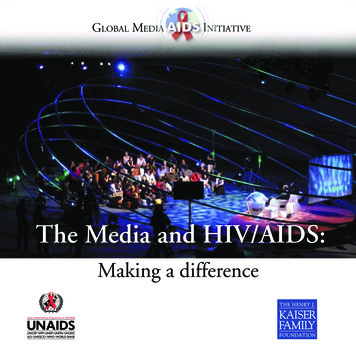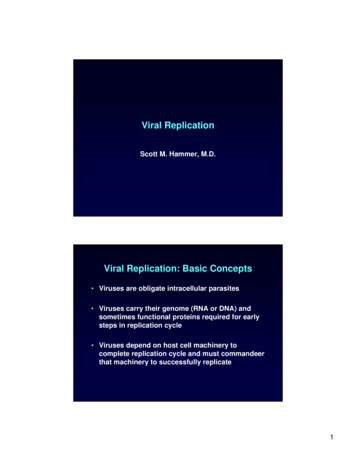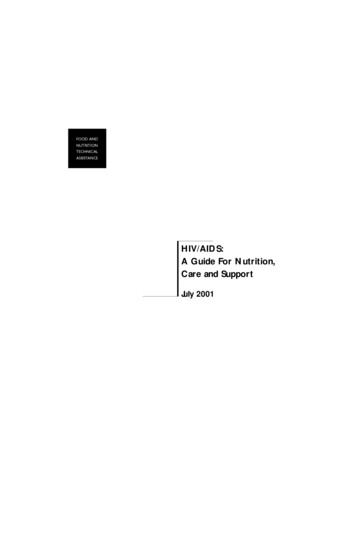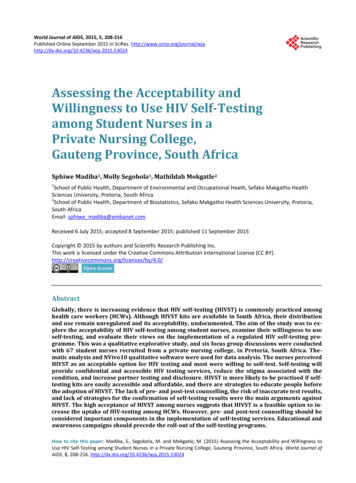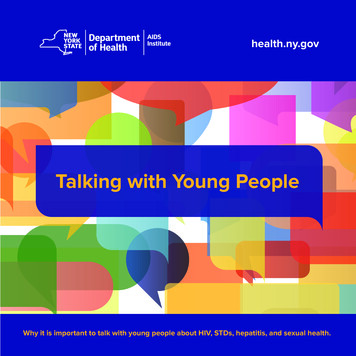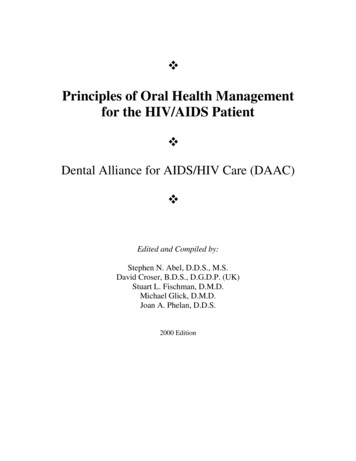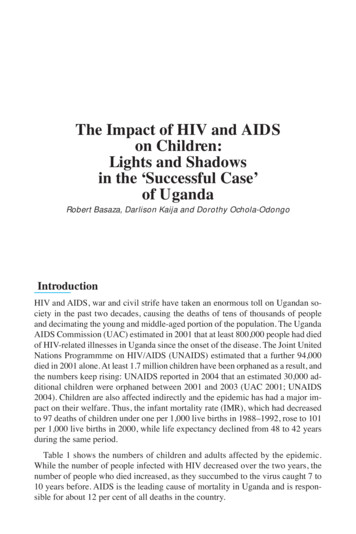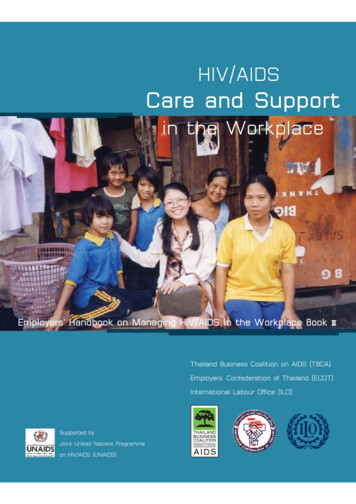
Transcription
HIV/AIDSCare and Supportin the WorkplaceEmployers' Handbook on Managing HIV/AIDS in the Workplace BookThailand Business Coalition on AIDS (TBCA)Employers' Confederation of Thailand (ECOT)International Labour Office (ILO)Supported byJoint United Nations Programmeon HIV/AIDS (UNAIDS)
HIV/AIDSCare and Supportin the WorkplaceThailand Business Coalition on AIDS (TBCA)Employers' Confederation of Thailand (ECOT)International Labour Office (ILO)Supported byJoint United Nations Programmeon HIV/AIDS (UNAIDS)
Copyright c International Labour Organization 2003First published 2003Publications of the International Labour Office enjoy copyright under Protocol 2 of the Universal CopyrightConvention. Nevertheless, short excerpts from them may be reproduced without authorization, oncondition that the source is indicated. For rights of reproduction or translation, application should bemade to the Publications Bureau (Rights and Permissions), International Labour Office, CH-1211 Geneva22, Switzerland. The International Labour Office welcomes such applications.Libraries, institutions and other users registered in the United Kingdom with the Copyright LicensingAgency, 90 Tottenham Court Road, London W1T 4LP [Fax: ( 44) (0)20 7631 5500; email: cla@cla.co.uk],in the United States with the Copyright Clearance Center, 222 Rosewood Drive, Danvers, MA 01923[Fax: ( 1) (978) 750 4470; email: info@copyright.com] or in other countries with associated ReproductionRights Organizations, may make photocopies in accordance with the licences issued to them for thispurpose.Thailand Business Coalition on AIDS, Employers' Confederation of Thailand, International Labour OfficeEmployers' Handbook on Managing HIV/AIDS in the WorkplaceBangkok, International Labour Office, 2003ISBN 92-2-114041-5Thai edition: Employers' Handbook on Managing HIV/AIDS in the WorkplaceISBN 92-2-814041-0, Bangkok 2003The designations employed in ILO publications, which are in conformity with United Nations practice, andthe presentation of material therein do not imply the expression of any opinion whatsoever on the partof the International Labour Office concerning the legal status of any country, area or territory or of itsauthorities, or concerning the delimitation of its frontiers.The responsibility for opinions expressed in signed articles, studies and other contributions rests solelywith their authors, and publication does not constitute an endorsement by the International LabourOffice of the opinions expressed in them.Reference to names of firms and commercial products and processes does not imply their endorsementby the International Labour Office, and any failure to mention a particular firm, commercial product orprocess is not a sign of disapproval.For information on how to obtain this publication, please write to the ILO Regional Office for Asia andthe Pacific, 11th Floor, United Nations Building, Rajdamnern Nok Avenue, Bangkok 10200, Thailand [Fax: 66 2 280 1735, 288 3062; E-mail: bangkok@ilo.org]. Catalogues and lists of recent and forthcomingILO books are available free of charge from the same address. ILO publications can also be obtainedthrough major booksellers or ILO local offices in many countries, or direct from ILO Publications,International Labour Office, CH-1211 Geneva 22, Switzerland. Catalogues or lists of new publications areavailable free of charge from the above address, or by email: pubvente@ilo.orgVisit our website: www.ilo.org/publnsPrinted in Thailand
Page1. Workplace care and support2-32. What to do when an employee tells you they have HIV/AIDS33. Responding to destructive rumours4-54. HIV-positive employees should read this first5-65. Monitoring progress of HIV infection:CD4 count and viral load test6-7Booklet 3:HIV/AIDS Care and Supportin the Workplace
HIV/AIDSCare and Supportin the Workplace
HIV/AIDS Care and Supportin the Workplace1Providing workplace care and support helps to ensure that employees with HIV/AIDS remain healthy andproductive at work. In addition, care and support programmes can boost workforce morale by showingthat the company is truly concerned about the health and well-being of its employees.Costs need not be high. Many companies have their own health services in place which can, with a littletraining, offer counselling and care in relation to HIV/AIDS. Costs can be further reduced by collaboratingwith community health centres, hospitals and specialized NGOs, including self-help groups of people withHIV/AIDS. Booklet 4, Care and Support Contacts, provides contact information for many of theseorganizations.Depending on your company's needs, a care and support programme could include the following:- Creating a supportive workplace environment, where discrimination is not tolerated and where workingconditions are flexible enough to allow workers with HIV/AIDS to remain employed and productive;- Referral to clinics providing voluntary, confidential counselling and testing;- Treatment for sexually transmitted diseases (which in turn reduces the risk of HIV infection);- Prophylaxis and treatment for opportunistic infections related to HIV/AIDS;- Antiretroviral therapy to help people with HIV/AIDS to stay healthy. (This should only be provided if thecompany knows it can be maintained in the long term.); and- Employee and family assistance programmes.One person within the human resources department or management team should be assigned as a focalpoint for addressing the workplace needs of employees with HIV/AIDS.
2HIV/AIDS Care and Supportin the Workplace1. Workplace care and supportEvery individual's needs for workplace care andsupport are different. The following guidelines andprinciples should help in deciding what care andsupport to provide:1. Listen to the employee. Negotiate care andsupport with them and do not dictate!2. Do not treat employees with HIV/AIDSdifferently from other employees with a seriousillness or condition, in terms of employmentand promotion, medical benefits and changesto their work duties and conditions;3. Create an open, supportive atmospherebetween employees and management;4. Ensure that care and support do not drawattention to the employee with HIV/AIDS andlead to resentment or abuse from co-workers;5. Hold HIV-positive employees accountable fortheir assigned work duties. Do not lower yourprofessional expectations just because theemployee is HIV-positive. Providing care andsupport does not mean having to employunproductive staff;6. Keep every employee's health statusconfidential at all times; and7. Make sure care and support is responsive tothe changing needs of the HIV-positiveemployee over time.Appropriate workplace care and support for eachindividual case should be negotiated between theHIV-positive employee, management and employees'representatives (if the employee wants to involvethem). To protect confidentiality, as few people aspossible should be involved in the process, andthe HIV-positive employee's permission should besought before any new person is involved. Thecare and support package should be guided bythe company's HIV/AIDS policy.Changes to work duties and conditionsAll employees with HIV/AIDS will at some pointneed some appropriate changes to their workduties and conditions in order that they can keepworking productively. Depending on the needs ofthe HIV-positive employee and the company, thefollowing could be considered as part of the careand support package: Flexibility in the work schedule, including timeoff for healthcare/counselling appointments; Reassigning the employee to a less stressfulposition, with tasks that suit their changingcapabilities; Providing short-term and/or long-term leavewith full or partial pay; Creating more part-time positions; Moving from commission-based tocompensatory salary; and Allowing employees to work from home.Employee and family assistanceAn employee with HIV/AIDS will have manyconcerns outside the workplace. For example, ifthe employee is in a long-term relationship, it ispossible that their partner also has HIV/AIDS.Loss of income and treatment costs might beputting the family under considerable financialpressure. They may be eligible for benefits thatthey do not know about. There may also be legalconcerns, especially about inheritance when afamily member dies.The company should consider helping to addresssome of these concerns, in order to reduce stressthat might affect the employee's health and work,as well as to demonstrate that the company isconcerned about its staff's well-being. Employeeand family assistance could include:
HIV/AIDS Care and Supportin the Workplace1. Provision of technical assistance to HIV-positiveemployees and their families on legalmatters, claiming benefits, etc.;2. Financial assistance to the family;3. Ensuring that employees with HIV/AIDS do notlose some or all of their health insurancecoverage; and4. Providing prompt notification on continuinghealth benefits after employment is terminated.3available for people affected by HIV/AIDS(see Booklet 4, Care and Support Contacts);5. Negotiate workplace care and support with theemployee (see above);2. What to do when an employee tells youthey have HIV/AIDSIf an employee approaches you privately andinforms you that they are HIV-positive, your firstresponse should be to provide emotional supportand positive reinforcement. When they first learnthat they have HIV/AIDS, people have a range ofemotional reactions. They may be shocked anddisorientated, and even disbelieving. You can helpthem to get through this emotional crisis. Youshould not ask them how they contracted HIV, orbehave in a way that shows any disapproval ordiscrimination.The following should help you to manage thesituation effectively:1. Reassure the employee that they will not beasked to leave work and that all informationabout their status will be treated asconfidential;2. Ask how the employee learnt of their HIVstatus-have they actually been tested? If not,suggest that they seek confidential counsellingand testing in a health clinic or hospital;3. Encourage the employee to visit a doctor forprofessional advice on healthy lifestyle changes,treatment, and fitness for work;4. Also, encourage the employee to seekprofessional psycho-social support, for examplefrom self-help groups of people living withHIV/AIDS, and inform them about other services6. Give extra attention to the continued HIV/AIDSeducation of all staff. Ensure that the HIVstatus of the employee remains confidentialand be vigilant that no discriminatory practicesarise at the workplace; and7. Try to establish an open dialogue with theemployee, so that they feel free to come toyou for advice and discuss problems and theirchanging needs inside and outside theworkplace.After the initial emotional crisis (which could takedays, months or longer, depending on the personand the support they receive), an employee withHIV/AIDS will usually start to adjust their attitudesand behaviour towards their life and their career.They will be less tense and worried and will startto settle back into their normal work routine. Onesign of this may be that they start to take bettercare of their health and appearance again. Thesupervisor and co-workers can help this processby integrating them back into normal workplacelife, thereby increasing their self-esteem.In the later stages of HIV/AIDS, employees mayhave extra needs related to work, such as extradays of sick leave. Make sure workplace care andsupport responds to these changing needs, withinthe limits of company policy.
4HIV/AIDS Care and Supportin the Workplace3. Responding to destructive rumoursIt sometimes happens that rumours are spread around the workplace that an employee has HIV/AIDS. Ifthe staff are already well educated about HIV/AIDS, the rumours will probably not cause too manyproblems. In other cases, particularly when the company has no HIV/AIDS policy in place or has notestablished a programme of workplace HIV/AIDS prevention and education, rumours can seriously disruptoperations, could force managers to make some difficult decisions, and could even lead to theresignation of valuable workers.When you become aware of such a rumour, your first response should be to try to assess its immediateimpact. If it is causing fear and confusion in the workplace, reassure staff that they cannot contract HIVthrough casual contact and they can continue to work safely. If they are concerned that a member ofstaff appears to have symptoms of opportunistic infections, tell them that opportunistic infections areonly dangerous to people with HIV/AIDS.Once you know who is responsible for starting and spreading the rumour, find out the reason. It may bethat one employee or their partner is visibly sick, and that the employee's co-workers were afraid of HIVinfection. Make sure they understand that they are not in danger, but also tell them that spreading thiskind of rumour is unacceptable behaviour.Think carefully about how you should approach the employee who is the subject of the rumour, andwhether it is actually necessary to do so. If you approach them too openly, their colleagues will bewatching to see what happens next. It will be distressing for the employee and you may find the otherstaff demanding to know from you whether the employee has HIV/AIDS.If you do approach the employee, do it in private without alerting the other staff, perhaps even outsidethe workplace. Do not try to push the employee to tell you whether they have HIV/AIDS-it is theemployee's right to keep this confidential, and they will tell you when they are ready. Simply make surethe employee knows what care and support they can expect from the company. If they are clearly sick,encourage them to see a doctor.
HIV/AIDS Care and Supportin the Workplace5You should not ask the employee who has been the subject of the rumours to stop work, eventemporarily. This would send the wrong message and is likely to make the employee more distressed.However, if the employee wishes to stay away from work, stress that the company will take action tofacilitate their return. If the employee wishes to resign, make sure they take time to consider thedecision carefully. You could consider providing assistance to them and their family.To ensure that similar situations do not arise again, organize an executive briefing on HIV/AIDS for seniormanagement (see Booklet 2, HIV/AIDS Prevention and Education in the Workplace) and encourage therapid establishment of a company HIV/AIDS committee and HIV/AIDS policy (see Booklet 1, Preparingyour Business for the Challenge of HIV/AIDS). Also organize an HIV/AIDS education programme for allemployees, so that they are more understanding towards HIV-positive colleagues and know how toprotect themselves from HIV/AIDS in the future.4. HIV-positive employees should read this firstYou can live a long and healthy life with HIV. In the last few years, medicines have been developed thatcan effectively control the virus and maintain your body sufficiently strong to stay healthy. At the sametime, the cost of AIDS drugs, and the cost of drugs to treat the infections that often come with AIDS,have fallen rapidly. Although there is still no cure for HIV/AIDS, it is manageable and treatable.To maintain good health you need to understand that your immune system, which is your body'sprotection mechanism against disease, is unique. You can strengthen it but you can not completelychange it. Regularly maintaining your physical and emotional health is the best way to help your body'simmune system to fight off illness. To maintain good physical and emotional health you should considerthe following suggestions:1.) Reflect and act. Recalling when you may have been infected with the AIDS virus willhelp you seek the best treatment and plan for the future. On average, HIV-positivepersons in Thailand will need regular medical advice after 8-10 years. Have yourhealth checked regularly to prevent and treat illness and to determine when to starttaking AIDS drugs. Talk to a counselor and consider joining a support group of peoplewith HIV/AIDS.2.) Positive motivation is most important in maintaining a long and healthy life. Thoughsupport from friends and family is very important, the most important factor is yourself-acceptance and motivation.3.) Educate yourself by reading about HIV/AIDS, the body's immune system,the treatment of illnesses that may occur and how to maintain ahealthy lifestyle. Seek information about AIDS drugs and their costs,and where to get psycho-social support. Find out about your rights
6HIV/AIDS Care and Supportin the Workplaceand latest developments in government assistance. Try to find a doctor whom you trust and withwhom you can discuss your questions.4.) Continue working as normal. This will help you maintain a positive, healthylifestyle and not isolate yourself. You will not pose a threat to your colleagues,and if you maintain your health, you will be able to perform your duties asbefore. Nowadays, many people understand that they can live and work withHIV-positive colleagues.5.) Try to avoid stress and get seven or eight hours' sleep a night to help your immunesystem to fight off illness.6.) Proper nutrition is very important. You will need to eat more to maintainyour body weight. Eat foods with lots of proteins (such as meats, fish,beans and nuts), rice and plenty of fruits. Avoid very spicy foods, as theymay cause diarrhea. Exercise regularly to build and maintain muscle. Drinkplenty of liquids to help your body deal with any medications you are taking. Practice food safety.Keep your kitchen clean, wash foods, avoid left-overs and be careful about food preparation andstorage. Quit drinking alcohol and smoking if possible.7.) Always use condoms when having sex, to protect your sexual partners and avoidthe risk of being infected again.8.) Plan ahead for future costs. Seek advice from your doctor or counselor onfuture expenses for medical treatment. Set aside money for times of illnessthat may occur.9.) Maintain normality. Do not panic. Maintain your social activities. Makenew friends by participating in support groups of HIV-positive peoplethat exist throughout the country.5 . Monitoring progress of HIV infection: CD4 count and viral load testTwo laboratory tests are critical to assessing the progression of HIV/AIDS and determining when to starttreatment with AIDS-drugs: CD4 count and viral load test. Both tests are conducted through a bloodsample drawn from a vein in your arm.The CD4 count measures the number of CD4 cells in your blood and is used to assess the strength ofyour immune system, which is your body's protection mechanism against disease. CD4 cells are a typeof white blood cell that help to identify, attack, and destroy specific bacteria, fungi, and other germs thataffect the body. CD4 cells are a major target for HIV. The number of CD4 cells in the blood gradually
HIV/AIDS Care and Supportin the Workplace7declines as HIV disease progresses, thus weakening your body's ability to fight off illnesses. If you havebeen diagnosed with HIV, ask your doctor to conduct a CD4 count in order to find out how strong yourimmune system is, how far HIV has advanced, and how much you may be at risk of infections due to aweakened immune system. The CD4 count should be repeated every three to four months in order tomeasure the progression of HIV. If your CD4 count declines over several months, your doctor mayrecommend beginning anti-retroviral therapy (taking AIDS-drugs). Your CD4 count should increase orstabilize as a result of effective therapy. Normal CD4 counts in adults range from 500 to 1,500 cells permicroliter of blood. In general, doctors will prescribe AIDS-drugs when CD4 levels drop below the rangefrom 200 to 350.The CD4 count is used in combination with the viral load test, which measures the quantity of HIV inthe blood. The viral load test should be repeated as regularly as the CD4 count in order to monitor theprogression of the disease. It shows how actively the virus is reproducing in the body and indicates whenanti-retroviral therapy should be started. A rising count of HIV indicates that an infection is gettingworse, while a falling count indicates improvement and suppression of the HIV infection thanks toeffective HIV-therapy.
HIV/AIDSCare and Supportin the WorkplaceThe Booklets of the seriesEmployers' Handbook on Managing HIV/AIDS in the WorkplaceIncludeBookBookBookBookPreparing your Business for the Challenge of HIV/AIDSHIV/AIDS Prevention and Education in the WorkplaceHIV/AIDS Care and Support in the WorkplaceSupport and Care Referral Network
Thailand Business Coalition on AIDS (TBCA)Employers' Confederation of Thailand (ECOT)International Labour Office (ILO)Supported byJoint United Nations Programmeon HIV/AIDS (UNAIDS)
treatment, and fitness for work; 4. Also, encourage the employee to seek professional psycho-social support, for example from self-help groups of people living with HIV/AIDS, and inform them about other services available for people affected by HIV/AIDS (see Booklet 4, Care and Support Contacts); 5. Negotiate workplace care and support with the
